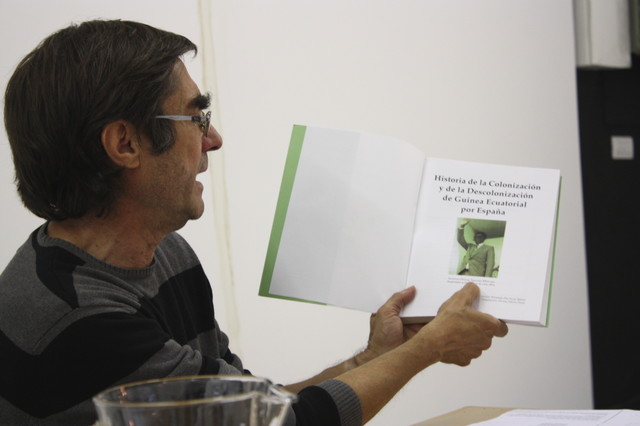Forms of formless knowledge
“Pre-colonial, Colonial and Post-colonial Society and Culture in Equatorial Guinea”. Juan Aranzadi
by
(Talk/Presentation of the BUNGE [Biblioteca Universitaria de Guinea Ecuatorial – University Library of Equatorial Guinea] Collection of the UNED [Universidad Nacional de Educación a Distancia – Open University] publishers, and of the Anthropological and Inter-cultural Research Project of which it forms part).
The basis for this talk is the presentation of the first three volumes of the University Library of Equatorial Guinea: El pamue imaginado [The Imagined Pamue], by Raúl Sánchez Molina; La democracia en Guinea Ecuatorial [Democracy in Equatorial Guinea], by Amancio Nse; and the text of the Segundas Jornadas de Antropología de Guinea Ecuatorial [Second Anthropology Conference of Equatorial Guinea]. It is also based on the uncharitable, and possibly false, supposition that the audience is almost completely ignorant about Equatorial Guinea. This talk will try to provide some basic information about the ethnology and history of the peoples of Equatorial Guinea, and about the centuries-old ignorance and disdain for these questions of the Spanish colonizers, including intellectuals and academics. It will conclude with a reflection on the pertinence, or lack of pertinence, of so-called “post-colonial” studies for understanding the current socio-cultural situation in Guinea in the light of two recent concrete events or phenomena: the hunger strike “on Facebook” of a renowned Guinean writer with the invaluable help of two Spanish anthropologists; and the marked contrasts amongst the processes of evolution of the “religions of Iboga” (Bwiti and Mbiri) in Equatorial Guinea, in Gabon-France and on Internet.
Juan Aranzadi
Juan Aranzadi was born in the town of Santurce (in the province of Biscay) in 1949. He graduated in philosophy at the University of the Basque Country (UPV) with a thesis on “La Mímesis en Platón [Mimesis in Plato]” and he obtained a PhD in Social Anthropology with a thesis entitled “Semio-lógica, Música y Piedad en la Antropo-sofía de Lévi-Strauss [Semio-logic, Music and Piety in the Anthropo-sophy of Lévi-Strauss]” (both theses remain unpublished). Between 1983 and 1989 he was a lecturer in the History of Religions and the Philosophy of Symbolic Forms in the Philosophy Faculty of Zorroaga (Euskal Herriko Unibertsitatea / Universidad del País Vasco) and since 1989 he has been a Senior Lecturer in Social Anthropology in the UNED. In the current Anthropology Degree he is responsible for the subjects: Anthropology of Kinship, Anthropology of Religion and Anthropology of the Peoples of Equatorial Guinea. His principal publications are Milenarismo Vasco. Edad de Oro, Etnia y Nativismo [Basque Millenarism: Golden Age, Ethnic Group and Nativism], Ed. Taurus, Madrid, 1981 (new expanded edition in 2001); El Escudo de Arquíloco. Sobre mesías, mártires y terroristas (The Shield of Archilochus: On Messiahs, Martyrs, and Terrorists), 2 vols., Antonio Machado Libros, Madrid, 2001; Good-bye ETA, Hiria liburuak, San Sebastian, 2005; Introducción histórica a la Antropología del Parentesco [Historical Introduction to the Anthropopology of Kinship], Ed. Universitaria Ramón Areces, Madrid, 2008.
He carried out his principal field work in Equatorial Guinea, studying the Bwiti Fang, in the years 1992 and 1993, but it is only recently that he has started to publish several articles on Guinean questions: “Supervivencias actuales del parentesco tradicional Fang [Present-day Survivals of Traditional Fang Kinship]”, in Primeras Jornadas de Antropología de Guinea Ecuatorial, UNED Ed., Madrid, 2009; “Bubis o Bochoboche [Bubis or Bochoboche]”, in Palabras. Revista de las ideas y de la Cultura/Fundación España Guinea Ecuatorial, nº 01, November 2009; “Arte, parentesco y antepasados en el rito byeri de los Fang [Art, Kinship and Forebears in the Byeri Rite of the Fang]”, in the Exhibition Catalogue Africa. Objetos y Sujetos, Cajastur, 2010; “Transformaciones del matrimonio bubi [Transformations of Bubi Marriage]”, in Segundas Jornadas de Antropología de Guinea Ecuatorial, BUNGE-UNED Ed., Madrid, 2011. He is preparing three books on Equatorial Guinea which he hopes to publish in the next few years: Parentesco, etnicidad y “género” en Guinea Ecuatorial [Kinship, Ethnicity and “Gender” in Equatorial Guinea], Poblaciones nativas y grupos étnicos en Guinea Ecuatorial [Native Populations and Ethnic groups in Equatorial Guinea] and El antropólogo bandji. Una iniciación al Bwiti entre los Fang de Guinea Ecuatorial [The Bandji Anthropologist. An Initiation into the Bwiti amongst the Fang of Equatorial Guinea].
